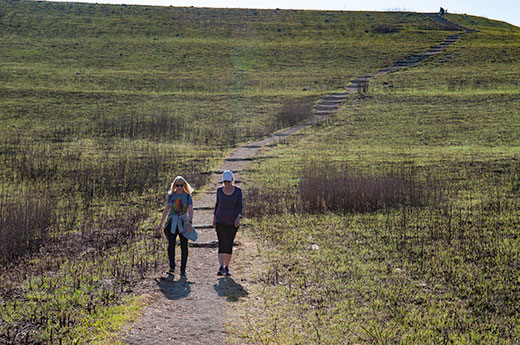
While Walk Kansas encourages teams to walk a distance equivalent to the length of Kansas, many activities qualify toward distance traveled.
Move Your Way: Walk Kansas encourages all forms of physical activity
Popular program begins March 28
March 22, 2021
MANHATTAN, Kan. – Sharolyn Jackson says there’s no need to be deceived by the name of one of K-State Research and Extension’s most popular statewide programs; there are a lot of avenues to physical health.
Jackson is the coordinator of Walk Kansas, which begins its 21st year on March 28. The eight-week program, which will run through May 22, annually draws about 7,000 participants.
While the basis of the program is to form teams of co-workers, friends, family or others to walk an equivalent distance of the state of Kansas, many other forms of physical activity also count.
“The best kind of physical activity is one that you will actually do,” Jackson said. “So if you don’t enjoy it, you’re not going to continue to do it. You need to find something you like to do that’s enjoyable and that you can work into your lifestyle.”
Listen to an interview by Jeff Wichman with Sharolyn Jackson on the weekly radio program, Sound Living
She noted that the program touts the motto, ‘Move Your Way,’ which means that activities like swimming, biking, jogging, rolling and many more count toward meeting the team’s Walk Kansas goal.
“Any kind of movement can count,” Jackson said. “We ask participants to log their minutes of activity, not distance.”
“People with health conditions and disabilities are encouraged to participate by doing the type of activity that works for them. Research supports that physical activity is safe for almost anyone and that health benefits far outweigh risks.”
The program is based on the Physical Activity Guidelines for Americans, published by the U.S. Department of Health and Human Services. The minimum guideline to achieve health benefits is to do at least 150 minutes (or 2 ½ hours) of moderate physical activity per week.
“A guideline for moderate activity is that you can just barely carry on a conversation,” Jackson said. “If you can sing during your activity, you need to work a little harder.”
Walk Kansas, she said, will offer three challenges for teams this year: one for teams aiming to meet the 2 ½ hour minimum; a second challenge for those who’d like to aim for four hours a week; and a third for those setting a goal for six hours of physical activity per week.
There is also a “solo trail” in which individuals can participate alone.
Jackson said participants will receive weekly electronic newsletters and online support regardless of which challenge they are participating in.
“We are going to take a look at some chronic diseases this year and how physical activity in particular can help you delay, prevent and even manage those chronic diseases,” she said.
Some of the areas that will be addressed include mental health, heart disease, osteoporosis and bone health, Alzheimer’s disease and overall brain health, obesity, arthritis, diabetes and cancer.
More information and registration is available online at www.WalkKansas.org. Team members can be located anywhere in the world, Jackson said.

